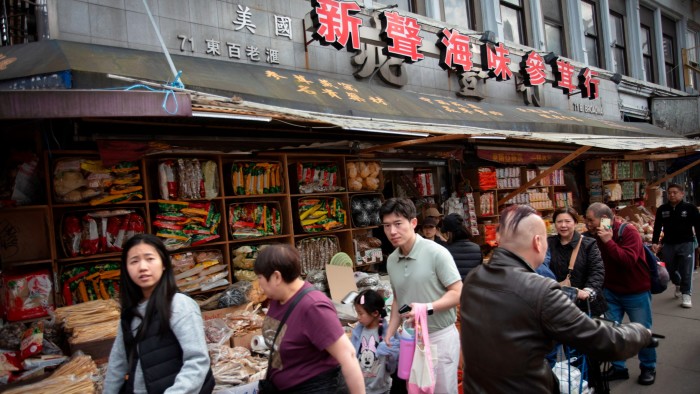Unlock the Editor’s Digest for free
Roula Khalaf, Editor of the FT, selects her favourite stories in this weekly newsletter.
Ever since Donald Trump’s imposition of 145 per cent tariffs on Chinese imports, Andy Wang has been panic buying supplies from rice wine to plastic containers for his restaurant in New York’s Chinatown.
Wang said that the price hikes expected on Chinese goods could put the Taiwan Pork Chop House he founded 26 years ago out of business, and force him into early retirement.
“I have to stock up so I can keep operation costs stable for as long as possible,” he said in an interview in his restaurant basement surrounded by excess supplies. “Everything you see here, including some food ingredients, comes from China and the US either doesn’t have a substitute or has a very expensive one.”
Wang’s is among thousands of Chinese American small businesses in New York that are struggling to cope with the worst ever US-China trade war as Washington and Beijing show little signs of flexibility in striking a deal.
Trump’s aggressive tariff hikes have dealt an especially big blow to the community that relies on Chinese goods to stay afloat.

The economic impact is worse than what Chinatown experienced after September 11, when customer traffic vanished for several months, according to New York advocacy group the Chinatown Partnership.
“Tariffs will have a lasting and devastating impact on the Chinese American community,” executive director Wellington Chen said.
Home to the largest Chinese population among US cities, New York imports more goods from China than from anywhere else, apart from Switzerland and Australia.
Chinese American retailers and food catering businesses rely especially heavily on suppliers from the world’s workshop to fill their shelves and equip their kitchens.
“I charge an affordable price but am still able to make a profit by sourcing from China,” said Wang, who sells pork chop over rice for $8.75, cheap by New York standards.
That business model may collapse as Trump’s tariff hikes push up prices of Chinese-made goods.

Chinese business owners said they could barely pass on cost increases to price-sensitive customers without sales falling.
“There is no way our customers can accept prices going from $100 to $200 within such a short timeframe,” said Wu Jianxi, general manager of C&A Supermarket in Flushing, a New York neighbourhood known for its Chinese community. “They will have to cut corners.”
Three food wholesalers in NYC said their transactions with suppliers in China had plunged since Washington imposed the latest tariff on Beijing. Deng Long, owner of Strong America Ltd, a New York-based trading company, said his Chinese partners had stopped taking new orders as the outlook for the tariff war remained unclear.
“China seems to be ready to decouple from the US,” said Deng, adding his Chinese suppliers showed little interest in sharing the tariff burden.
US buyers have also withdrawn orders. Hei Chan, manager of New Kam Man LLC in New York’s Chinatown last week asked his Chinese and Hong Kong partners to cancel shipments of dried mushrooms worth more than $1mn until the tariff disputes were “resolved”.

The plunge in imports has led to low inventories among wholesalers, prompting some of them to charge higher prices or ration sales. Deng of Strong America said he planned to increase prices by half next week following a 10 per cent increase this week.
“With a 145 per cent tariff, I’ll be giving you Chinese products for free if I sell them at the original price,” said Deng in his warehouse in Long Island City, where inventory is falling at a fast clip.
Other wholesalers began setting maximum sales quotas for buyers who are racing to stock up. Wang of Taiwan Pork Chop House said he was only able to purchase one box of microwave bowls on Monday after placing an order for six.
“This is really pitiful,” he said. “Everyone is hoarding.”
The increase in wholesale prices is starting to spread to retail. Six Chinese supermarkets in Chinatown and Flushing told the Financial Times they put prices for China-made products from rice cookies to spices up by 10 per cent to 50 per cent since the latest tariff hike.
More price rises are in the pipeline as most Chinese business owners expected their inventory bought before the tariff hikes to run out within two months.
C&A Supermarket‘s Wu said prices for Chinese goods may “surge” as soon as next month when the market starts to rely on imports that are subject to higher tariffs.
“We can’t live with a 145 per cent tariff for a single day,” he said.


